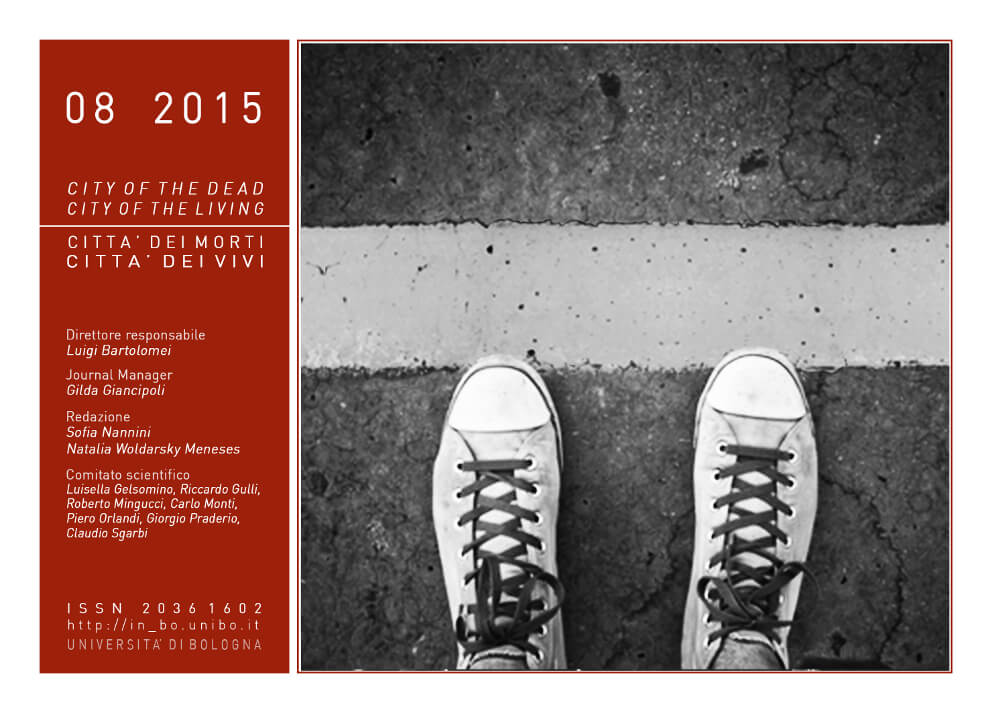Death and life new balances in Italian Lanscape
DOI:
https://doi.org/10.6092/issn.2036-1602/6074Keywords:
Funerary architecture, Funeral Home, Farewell Rooms, Secularization, CemeteriesAbstract
This article will analyze the most recent changes in spaces for the dead with respect to new rituals, beliefs and social behaviors in Italy. While in the past two centuries the geography of death was one designed only by extra-urban cemeteries, today new trends are acting to multiply funerary places within urban contexts. There are several factors contributing to this change. First, the new multi-faith profile of contemporary Italian society and its growing secularization are amplifying the request for spaces in which to celebrate all kinds of funeral or farewell rituals with a sense of dignity. This has opened a market for funeral homes or “case funerarie”, never seen before in Italy. Secondly, a wider social acceptance of cremation (recently approved by Catholic Church) introduces the possibility for a displacement of ashes in houses or in private cemeteries, even within urban settings.References
Acquaviva, Sabino. L’eclissi del sacro nella civiltà industriale, Milano: Edizioni di Comunità, 1961; [eng. Trans. “The Eclipse of the holy in Industrial Society”, Blackwell, London, 1979]
Aries, Philippe. Essais sur l’histoire de la mort en occident: du moyen age a nos jours, Paris: Editions du Seuil, 1975; [Eng. Trans. “Western Attitudes toward Death: From Middle Ages to the Present”, Baltimore: John Hopkins University Press, 1974]
Bertolaccini, Laura. Città e cimiteri: dall’eredità medievale alla codificazione ottocentesca, [eng. trans. “Cities and Cemeteries: from Middle Ages legacy to XIX century coding”] Roma: Kappa, 2004
Bartolomei, Luigi e Giorgio Praderio. New architectures for funeral houses in contemporary secularized Italian society. Premises and results of an interdisciplinary university research activity, in “Annales Universitatis Apulensis, Series Historica”, Alba Iulia: Special Issue 2/2010, pages: 469/480, 2010
Bartolomei, Luigi (2011 a). Places for a cult of memories in the Italian post-secular city, in “Annales Universitatis Apulensis, Series Historica”, Alba Iulia: Special Issue, 2011
Bartolomei, Luigi (2011 b). “A Modena la seconda Funeral Home italiana”, [eng. Trans. “In Modena the second italian funeral home”] in Il Giornale dell’Architettura, Torino: Allemandi editore, Ottobre 2011, n.98, p.5
Bartolomei, Luigi (2012 a). Evoluzioni contemporanee nell’architettura funeraria, [eng. Trans. “Contemporary Evolutions in funerary architecture”] Bologna: CSO, 2012
Bartolomei, Luigi (2012 b). “A Bologna il nuovo Crematorio”, [eng. trans. “Bologna new crematorium”] in Il Giornale dell’Architettura, Torino: Allemandi editore, Dicembre 2012, n.99, p. 3
Bombardieri, Maria. Moschee d’Italia: il diritto al luogo di culto. Il dibattito sociale e politico, [eng. trans. “Italian mosques: the right for places of worship. Social and political debate”] Bologna: EMI, 2011
Canella, Maria. “Lo spazio della morte. Alle origini del Cimitero Extraurbano”, [eng. trans. “The space of death: the origins of extra-urban cemeteries”] in Società e Storia, n.9/2002, pag. 769 - 773
Caritas e Migrantes. Immigrazione: dossier statistico 2012: 22° rapporto sull’immigrazione, [eng. trans. “Immigration: statistical dossier 2012: 22nd report on immigration”] Roma: IDOS, 2012
Cartocci, Roberto. Geografia dell’Italia cattolica, [eng. trans. “The Geography of Catholism in Italiy”], Bologna: Il Mulino, 2011
Cavana, Paolo. Mutamenti culturali ed evoluzione legislativa in Italia. In Strada, Gabriele (ed.) La morte e i suoi riti per una celebrazione cristiana dei funerali. Atti del convegno regionale di Imola 1-2 giugno 2009, [eng. trans. “Cultural changes and legislative development in Italy”, in “Death and its rituals for a Christian celebration of funerals”],Reggio Emilia: edizioni san Lorenzo, 2009, pp. 51-53)
CEI- Episcopal Commission for Liturgy. Il rinnovamento liturgico in Italia, [eng. trans. “Liturgical Renewal in Italy”], 1983, September 23rd, also avaiable on http://www.chiesacattolica.it/
Chenis, Carlo. Evangelizzare la cremazione per una icona della Chiesa. I termini della legge 130 del 30 Marzo 2001, [eng. trans. “Evangelize cremation as an Icon of the Church”] in “Rivista Liturgica”, n.5, pp. 756-780, Padova: edizioni il Messaggero, September/October 2005
Istat, Indagine conoscitiva sulla immigrazione e l’integrazione, [eng. trans. “fact-finding inquiry on immigration and integration”] presented at the National Statistical Institute Audition to the Italian parlamentary control committee on Schengen Agreement fullfillment, Roma, 2007, February 21st
Lanfranchi, Antonio (Bishop of Modena and Nonantola), Istruzione sul luogo di celebrazione dei funerali. [eng. trans. “Instruction on the place where to celebrate funerals” issued in Modena, June 24th 2011, also avaiable on http://www.webdiocesi.chiesacattolica.it
Monti, Daniela (ed.). Che cosa vuol dire morire, [eng. trans. “What does it mean to die”], Torino: Einaudi, 2010
Pinkus, Lucio and Filiberti, Antonio (eds.). La qualità della morte, [eng. trans. “The quality of death”] Milano: Franco Angeli ed, 2002)
Scheffler, Karl. L’architettura della metropoli e altri scritti sulla città, [eng. trans.”Metropolis architecture and other writings“] a cura di R. Mercadante, Milano: Franco Angeli ed., 2013, p. 125) (Original Edition in Berlin: Bruno Cassirer Berlag,1913)
Sozzi, Marina (ed.). La scena degli addii: morte e riti funebri nella società occidentale contemporanea: atti del convegno svoltosi a Torino il 24 e 25 settembre 1999 [eng. trans. “farewell set: death and funeral rituals in contemporary western society. Proceedings of the conference which took place in Turin, 1999, September 24-25] Torino, Paravia Scriptorium, 2001)
Scolaro, Sereno. Manuale di polizia mortuaria. La disciplina nazionale e regionale, [eng. trans. “ Manual of funeral law – National and Regional legislation”] Sant’Arcangelo di Romagna: Maggioli ed., 2013)
Downloads
Published
How to Cite
Issue
Section
License
Copyright (c) 2015 Luigi Bartolomei
Copyrights and publishing rights of all the texts on this journal belong to the respective authors without restrictions.
This journal is licensed under a Creative Commons Attribution-NonCommercial 4.0 International License (full legal code).
See also our Open Access Policy.
Metadata
All the metadata of the published material is released in the public domain and may be used by anyone free of charge. This includes references.
Metadata — including references — may be re-used in any medium without prior permission for both not-for-profit and for-profit purposes. We kindly ask users to provide a link to the original metadata record.







